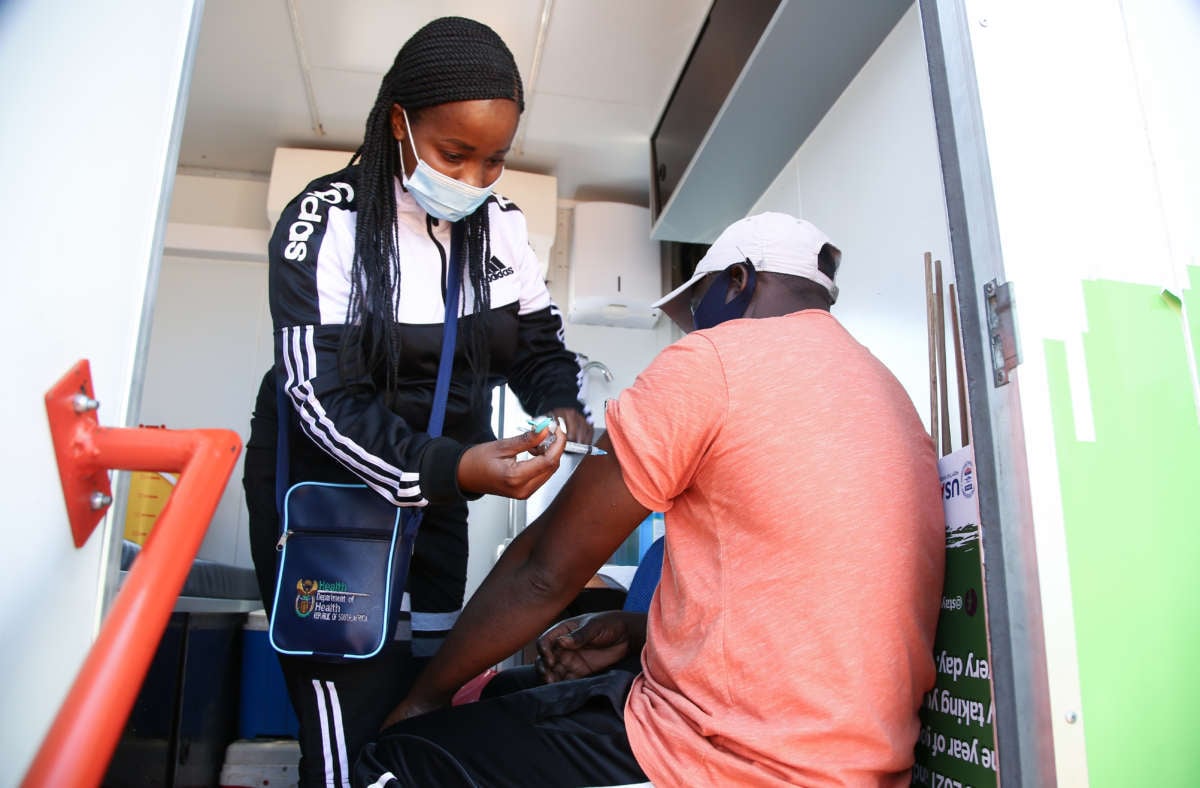Support justice-driven, accurate and transparent news — make a quick donation to Truthout today!
With a key panel of the World Trade Organization set to convene this week to discuss a potential patent waiver for Covid-19 vaccines, rich nations are under growing pressure to stop obstructing the proposal as the coronavirus continues to ravage poor countries that have been denied access to the lifesaving inoculation.
Nearly a year has passed since South Africa and India first introduced the temporary patent waiver, which now has the support of more than 100 WTO member nations — including powerful countries such as the United States and France. But Germany, the United Kingdom, Canada, Switzerland, Norway, and other rich nations have thus far refused to support the waiver, leaving powerful pharmaceutical companies with a stranglehold over the production of coronavirus vaccines and therapeutics.
The WTO’s TRIPS Council — a body that oversees the implementation of intellectual property rules — is scheduled to meet Tuesday to discuss the proposed waiver, which aims to lift legal barriers stopping manufacturers around the world from producing generic coronavirus vaccines for low-income nations.
“Despite the groundbreaking medical innovations delivered in the past year, and tall commitments by some powerful nations promising global solidarity and equity, access to these innovative Covid-19 medical tools remains scant in too many low- and middle-income countries,” Candice Sehoma, South Africa advocacy officer with Médecins Sans Frontières’ (MSF) Access Campaign, said in a statement Monday.
“People in these countries, facing life or death in this pandemic, can no longer rely merely on charitable or voluntary measures dictated by only a small number of high-income countries and the pharmaceutical industry they host,” Sehoma added. “We demand the countries opposing the TRIPS Waiver to stop blocking the will of the majority of the world to obtain this additional legal tool in the pandemic to achieve self-reliance in producing Covid-19 vaccines, treatments, and tests.”
Yuanqiong Hu, senior legal and policy adviser to MSF’s Access Campaign, said that adoption of the patent waiver would represent a “critical and historical step to remove monopoly barriers hindering increased global production and diversity of supplies — and all people’s access to desperately needed Covid-19 medical tools.”
As countries meet tomorrow to discuss the #TRIPSwaiver at the @wto, MSF calls on EU member states including Ireland, as well as the UK, Norway & Switzerland, to stop blocking this initiative on lifting the monopolies on lifesaving #COVID19 medical tools.https://t.co/o5pRjKLj6s pic.twitter.com/IwWfU2bTKf
— MSF Ireland (@MSF_ireland) September 13, 2021
The latest informal TRIPS Council meeting will come as the U.S. and other rich countries are preparing to make third doses of the coronavirus vaccine available to their populations — even as billions of people around the world have yet to receive a single dose.
During a press conference last week, World Health Organization (WHO) Director-General Tedros Adhanom Ghebreyesus estimated that 80% of the 5.5 billion vaccine doses administered globally thus far have gone to people in upper-income countries. Tedros is demanding a moratorium on booster shots until at least the end of the year in order to free up vaccine supply for poor nations.
“Almost every low-income country is already rolling out the vaccines they have, and they have extensive experience in large-scale vaccination campaigns for polio, measles, meningitis, yellow fever, and more,” Tedros said. “But because manufacturers have prioritized or been legally obliged to fulfill bilateral deals with rich countries willing to pay top dollar, low-income countries have been deprived of the tools to protect their people.”
“There has been a lot of talk about vaccine equity,” Tedros added, “but too little action.”
Last Thursday, the WHO Africa director Matshidiso Moeti warned that the continent is now on track to “get 25% less doses than we were anticipating by the end of the year” as rich nations hoard much of the existing supply.
Echoing Tedros, Moeti blamed the worsening vaccine delivery forecast on “prioritization of bilateral deals over international solidarity.”
“Every dose is precious,” Moeti said. “If companies and countries prioritize vaccine equity, this pandemic would be over quickly.”
Millions of people have died of Covid-19 since South Africa and India first introduced the patent waiver at the WTO last October, and more than 8,800 people across the globe are still dying each day as the Delta variant and other dangerous mutations continue to spread.
In the face of such grim figures, Australia last week became the latest country to endorse the patent waiver, a decision that public health campaigners hoped would build momentum for the proposal heading into the fresh round of negotiations.
“The tide is turning in the battle against global vaccine inequality,” Nick Dearden, director of the U.K.-based advocacy group Global Justice Now, said in a statement. “Australia’s support for a waiver puts the WTO in a strong position to make progress.”
“The British and German governments have no allies or excuses left,” Dearden added. “They must stop obstructing efforts to waive patents so that we can finally vaccinate the world.”
Matching Opportunity Extended: Please support Truthout today!
Our end-of-year fundraiser is over, but our donation matching opportunity has been extended! All donations to Truthout will be matched dollar for dollar for a limited time.
Your one-time gift today will be matched immediately. Your monthly donation will be matched for the whole first year, doubling your impact.
This matching gift comes at a critical time. As Trump attempts to silence dissenting voices and oppositional nonprofits, reader support is our best defense against the right-wing agenda.
Help Truthout confront Trump’s fascism in 2026, and have your donation matched now!
